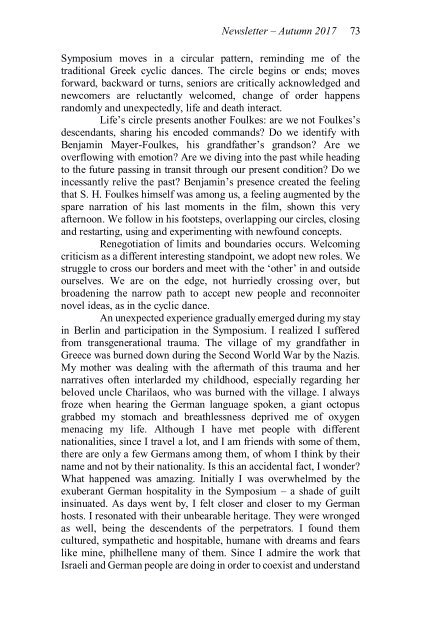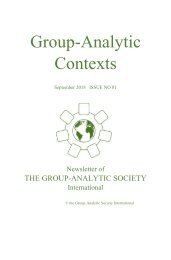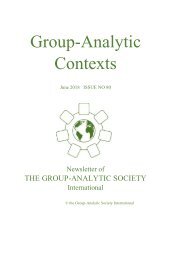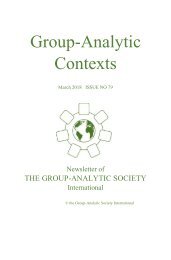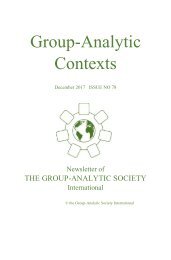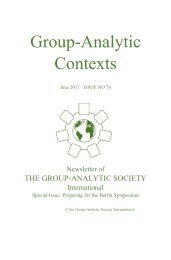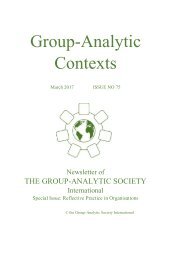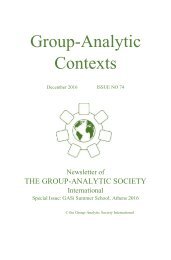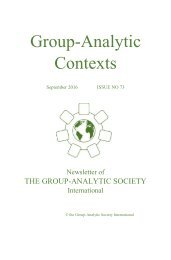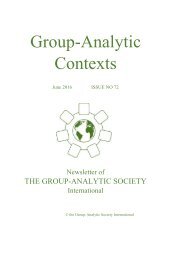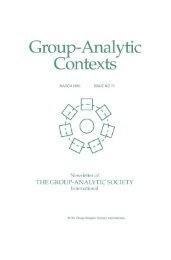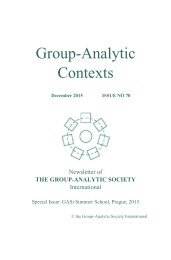Group Analytic Contexts, Issue 77, September 2017
Newsletter of the Group Analytic Society International
Newsletter of the Group Analytic Society International
Create successful ePaper yourself
Turn your PDF publications into a flip-book with our unique Google optimized e-Paper software.
Newsletter – Autumn <strong>2017</strong> 73<br />
Symposium moves in a circular pattern, reminding me of the<br />
traditional Greek cyclic dances. The circle begins or ends; moves<br />
forward, backward or turns, seniors are critically acknowledged and<br />
newcomers are reluctantly welcomed, change of order happens<br />
randomly and unexpectedly, life and death interact.<br />
Life’s circle presents another Foulkes: are we not Foulkes’s<br />
descendants, sharing his encoded commands? Do we identify with<br />
Benjamin Mayer-Foulkes, his grandfather’s grandson? Are we<br />
overflowing with emotion? Are we diving into the past while heading<br />
to the future passing in transit through our present condition? Do we<br />
incessantly relive the past? Benjamin’s presence created the feeling<br />
that S. H. Foulkes himself was among us, a feeling augmented by the<br />
spare narration of his last moments in the film, shown this very<br />
afternoon. We follow in his footsteps, overlapping our circles, closing<br />
and restarting, using and experimenting with newfound concepts.<br />
Renegotiation of limits and boundaries occurs. Welcoming<br />
criticism as a different interesting standpoint, we adopt new roles. We<br />
struggle to cross our borders and meet with the ‘other’ in and outside<br />
ourselves. We are on the edge, not hurriedly crossing over, but<br />
broadening the narrow path to accept new people and reconnoiter<br />
novel ideas, as in the cyclic dance.<br />
An unexpected experience gradually emerged during my stay<br />
in Berlin and participation in the Symposium. I realized I suffered<br />
from transgenerational trauma. The village of my grandfather in<br />
Greece was burned down during the Second World War by the Nazis.<br />
My mother was dealing with the aftermath of this trauma and her<br />
narratives often interlarded my childhood, especially regarding her<br />
beloved uncle Charilaos, who was burned with the village. I always<br />
froze when hearing the German language spoken, a giant octopus<br />
grabbed my stomach and breathlessness deprived me of oxygen<br />
menacing my life. Although I have met people with different<br />
nationalities, since I travel a lot, and I am friends with some of them,<br />
there are only a few Germans among them, of whom I think by their<br />
name and not by their nationality. Is this an accidental fact, I wonder?<br />
What happened was amazing. Initially I was overwhelmed by the<br />
exuberant German hospitality in the Symposium – a shade of guilt<br />
insinuated. As days went by, I felt closer and closer to my German<br />
hosts. I resonated with their unbearable heritage. They were wronged<br />
as well, being the descendents of the perpetrators. I found them<br />
cultured, sympathetic and hospitable, humane with dreams and fears<br />
like mine, philhellene many of them. Since I admire the work that<br />
Israeli and German people are doing in order to coexist and understand


